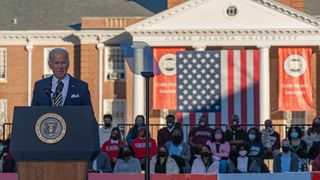US President Joe Biden came to office more than a year ago promising to “build back better”, declaring America was back and returning to its role as the leader of the democratic world. How’s that working out? And not just for the US but for Australia?
On Wednesday the US Studies Centre will release its annual State of the United States report, providing assessments based on survey research, trade and investment data, historical comparisons and consultations across our networks spanning the US political and policy establishment, but with a particular focus on implications for Australian interests.
Like the Biden administration, the US sits at a delicate moment. Covid continues to ravage the US with a per capita death toll more than four times seen elsewhere across the G20. Inflation and crime are back at the top of the US domestic political agenda, issues not experienced at such levels since the 1970s. Biden’s approval rating languishes at Trump-like levels, the bulk of his legislative agenda is stalled and Republicans are all but assured of taking the House of Representatives in midterm elections in November.
Still, the Biden administration has enjoyed success. More than 200 million Americans have been vaccinated against Covid-19. Record numbers of new jobs and economic growth followed the passage of a $US1.9 trillion ($2.65 trillion) Covid recovery package and Democrats legislated a $US1.2 trillion bipartisan infrastructure bill. A 40 per cent reduction in child poverty is one of the legacies of the Covid relief measures. Biden took the US back into international climate change forums but has been, and will be, unable to secure legislation to help meet emissions targets. And critically for Australian interests, under Biden we saw the announcement of the AUKUS security pact and an expansion and deepening of the Quadrilateral Security Dialogue’s remit.
For now, the US and the Biden administration are managing the Ukraine crisis as well as they can, rallying the democratic world with sanctions and military aid.
But of more consequence are trends we identify within the US, which are confronting for all democratic allies of America and especially Australia. Quite simply, the US is a house divided and partisan disagreements run deeper than ever measured. We must reach back to the Depression or the civil war to find periods of US history where the country has been more divided. Isolationism is at levels unseen in 70 years of scientifically rigorous survey research.
Sixty per cent of Americans say their nation’s “best days are in the past”, with even 40 per cent of Biden voters agreeing – roughly the same levels Democrats recorded during Donald Trump’s presidency. America’s levels of polarisation leave Australia’s division in the shade.
Trump voters name immigration, crime and the federal budget deficit as top issues of concern. Biden voters rate Covid-19, climate change and economic inequality. In foreign policy, Biden voters again rate climate change as priority one. For Trump voters, the top priority is working with allies to stand up to China. The surveys were taken before Russia’s attack on Ukraine on February 24. Democrats tend to focus on Europe and the Middle East, Republicans tend to look more towards Asia as a priority region.
In recent testimony to federal parliament, Department of Defence secretary Greg Moriarty observed: “Australia’s national resilience is an important contributor to our overall defence posture and national resilience depends on national unity.”
Repeatedly, our analysis leads us to a sobering conclusion: the US lacks the national unity that stewards of Australia’s security view as fundamental. The US lacks the national capacity, the unity and political will to do what it will take to return to its former pre-eminence. Like other US allies, Australia’s increased “burden sharing” can and must continue.
All this must be set against Trump’s presidency and the Republican Party’s dalliances with authoritarianism and populism, which have become emblems of party identification and set the stage for continued erosion of US democracy. With parallel surveys of the US and Australia we see Trump voters are as authoritarian as supporters of One Nation and the United Australia Party.
Trump’s false insistence that fraud cost him the 2020 election – a claim rebuffed in courts and by audits and recounts – is accepted by 69 per cent of his voters and by one in three overall. Trump’s “big lie” is dangerous, not only because it challenges Biden’s legitimacy but because it gives the Republican rank-and-file cause to distrust democratic institutions and provides cover to Republican efforts to roll back voting rights further – the biggest driver of US democratic backsliding. The “big lie” is as harmful to liberal democracy as any disinformation campaign launched by a foreign adversary. As Paul Kelly wrote in these pages a few weeks ago, Trump’s Australian supporters “need to be exposed for their fraudulent apologias”.
In ratings of global levels of liberal democracy the US fell out of the top 30 national rankings in 2020. Republican restrictions on voting rights and free and fair elections suggest this trend will continue. Australia has always been rated as more democratic than the US but never by much, at least not until the Trump years.
For Australia, two conclusions follow. First, in an era of rapid geo-strategic change, the US alliance is Australia’s single most valuable strategic asset, not only because of the security guarantees but also through the pathways to technologies and capabilities that will keep Australia safe and prosperous. However, nothing can be taken for granted.
AUKUS will be no cakewalk and will require constant attention from Australian voices to overcome the distractions of deep internal division, vested interests and international security crises that occupy Washington as well as the steady rise of isolationism and protectionism within the US.
Second, Australia needs to come to terms with the illiberal trajectory of the US. We’ve long struggled to make sense of why the US differs so fundamentally from Australia, its indifference to inequality and its tolerance of violence prominent among the contrasts. Still, “shared values” feature prominently when leaders talk about Australia’s relationship with the US.
Both sides of Australian politics ought to prepare for a future in which many Australians look askance at a manifestly less democratic US, in which the realpolitik foundations of the Australia-US relationship are more relevant and starker.






